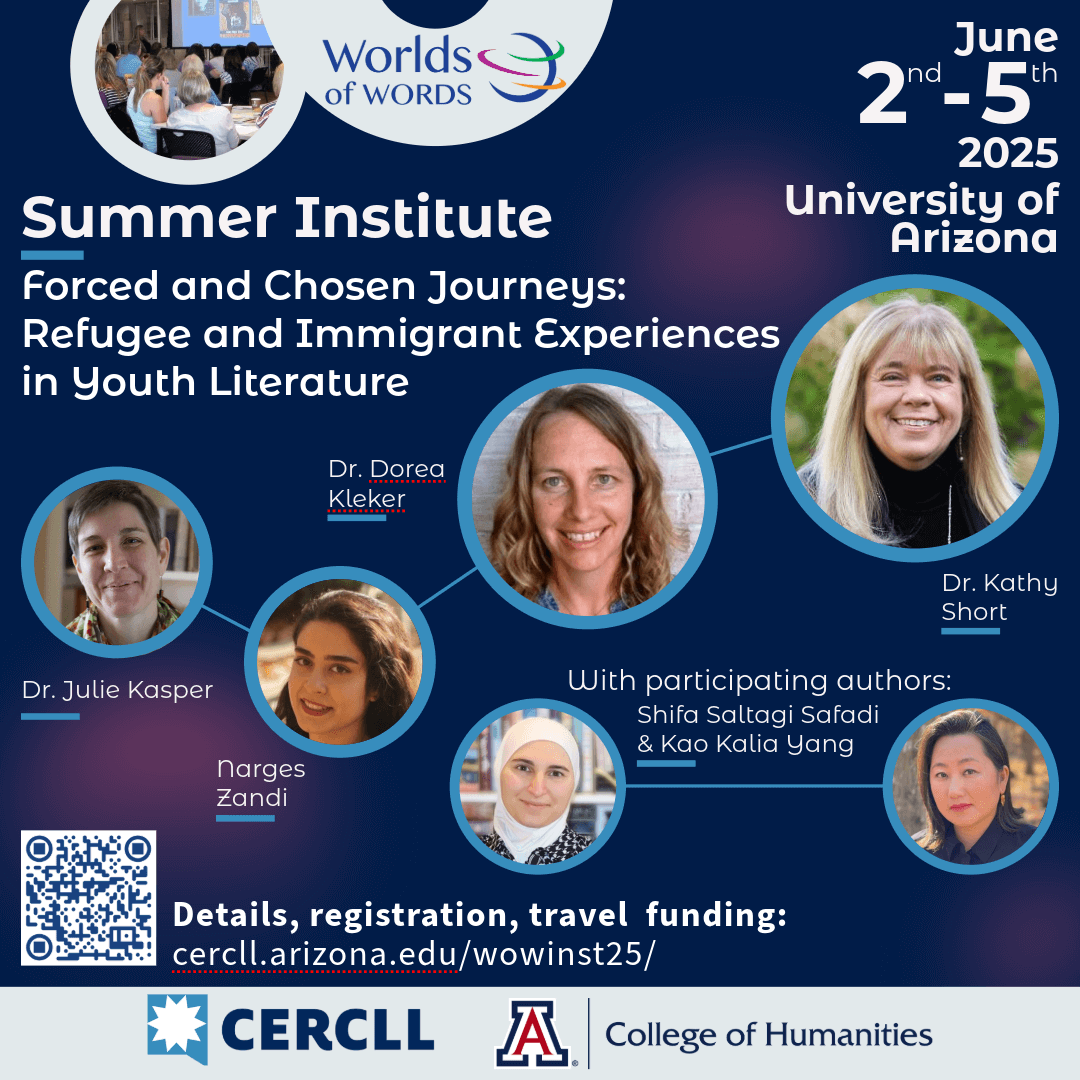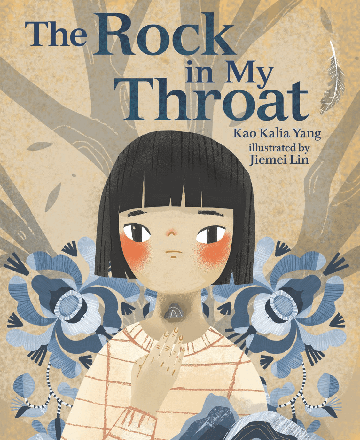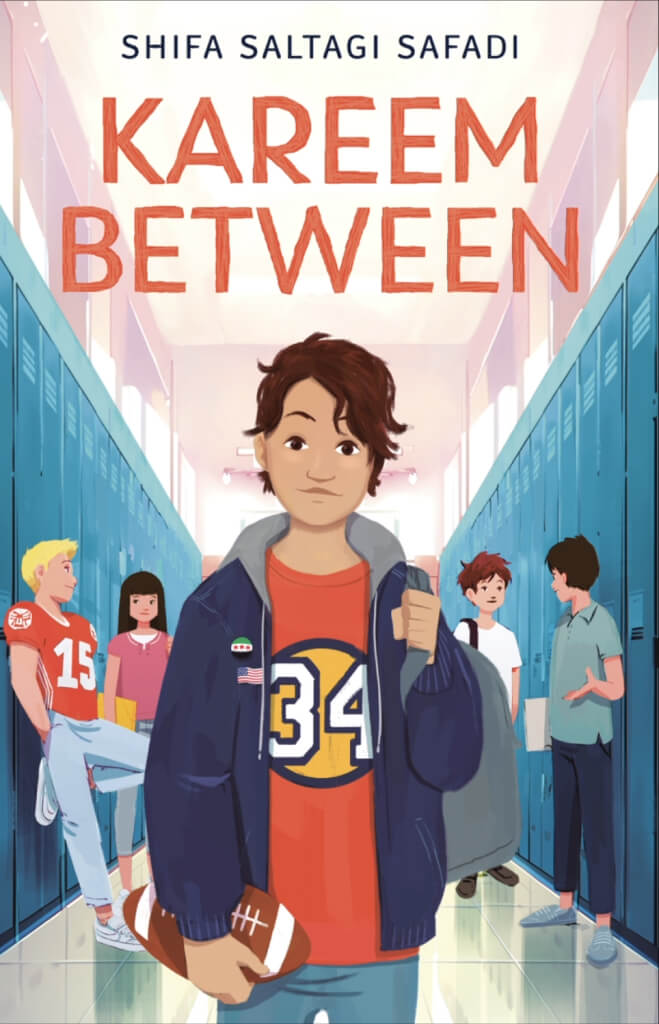Leaders: Regents Professor Kathy G. Short, Dr. Dorea Kleker, and Narges Zandi (University of Arizona)
Refugee Expert: Dr. Julie Kasper (University of Arizona)
Authors: Kao Kalia Yang and Shifa Saltagi Safadi
June 2-5, 2025
9 am – 4 pm at Worlds of Words, at the University of Arizona in Tucson, Arizona
(Registration closed on May 26.)
Join us for a four-day, in-person workshop to engage in experiences and books that invite children to immerse themselves in literature about refugee and immigrant experiences. In this interactive workshop, you will explore new picturebooks and novels for your work with students and participate in engagements with these books. You will also interact with children’s authors/illustrators who will join us to talk about their global books–Kao Kalia Yang, author of The Rock in My Throat, and Shifa Saltagi Safad, author of Kareem Between, winner of the 2025 National Book Award for Young People. You will receive their books along with booklists and other materials.
We are framing this workshop around the conceptual framework of journeys as movement along a pathway to examine the forced and chosen journeys in our own lives. Within this frame, we will explore refugee/immigrant books related to themes of displacement, difficult journeys, detention, belonging, home, language, memory, names, and walls. There will be time to browse books as well as use dialogue strategies to engage with books. We will also share our work with children around these books. Our goal is inviting children to critically engage with story as a means of making sense of their own lives, and of understanding the lives of children whose experiences differ from their own.
Participants will receive a PD Certificate. Registration is limited to 35 people.
Cost: $100 (includes lunch and materials)
Questions, contact: dkleker@arizona.edu or shortk@arizona.edu
See lodging and scholarship information below!
Biographical Details for the Presenters
Kathy G. Short
Kathy G. Short is a Regents professor and endowed chair of global children’s literature in the College of Education/University of Arizona and is Director of Worlds of Words: Center of Global Literacies and Literatures (wowlit.org). She has worked extensively with teachers around the world on literature and inquiry and has authored many books and articles. She served as President of the National Council of Teachers of English and the US Board of Books for Young People.
Dorea Kleker
Dorea Kleker is an early childhood teacher and educator. Focusing on students and teachers across a wide variety of educational contexts in both the U.S. and Latin America, her work focuses on global and multicultural children’s literature, literacy and play to develop intercultural understanding, and the use of literature to actively engage children as inquirers across all content areas.
Narges Zandi
Narges Zandi taught elementary school in Iran and is currently a doctoral student in Teaching, Learning, and Sociocultural Studies at the University of Arizona. In Iran, she engaged in academic writing and research aimed at enhancing school education. In her efforts to support equitable education, Narges utilized Autoplay Media Studio software to create projects designed to provide students with equal learning opportunities.
Julie Kasper
With three decades of teaching, learning, leadership, and research in refugee/(im)migrant education ecosystems at local, national, and global levels, Julie Kasper is committed to learning both in and beyond schools. Julie’s work includes co-creation of ongoing multimodal professional learning opportunities with and for teachers working with students and families of refugee/(im)migrant backgrounds in resettlement, displacement, and migration contexts.
Kao Kalia Yang
Kao Kalia Yang is a Hmong American writer, teacher and public speaker. Born in the refugee camps of Thailand to a family that escaped the genocide of the Secret War in Laos, she came to the U.S. at the age of six. Yang’s work includes creative nonfiction, poetry, and award-winning children’s books such as The Rock in My Throat, A Map into the World, From the Tops of the Trees, and The Diamond Explorer. More about this author: https://kaokaliayang.com/.
Shifa Saltagi Safadi
Shifa Saltagi Safadi is the National Book Award Winning author of Kareem Between, the Amina Banana series, and several picturebooks. Shifa was born in Syria and immigrated to the United States with her parents when she was a young girl. She is a bilingual Arabic/English speaker and is very familiar with the challenges of learning English and navigating two languages and cultures. She is a former English teacher and passionate about spreading a love of reading. More about this author: https://shifasafadi.com/.



Location
Located sixty miles north of the Mexican border, Tucson is the second largest city in Arizona (after the state capital of Phoenix), with roughly one million people calling the Tucson metropolitan area home. Indigenous people have lived here for more than 4,000 years, which makes Tucson one of the oldest continually inhabited areas in North America. Southern Arizona and the Tucson area form the ancestral homeland of the Tohono O’odham and Pascua Yaqui nations. Tucson’s current name derives from the one given to Sentinel Peak by the Tohono O’odham, “Ts-iuk-shan,” which refers to the fact that the base of the mountain is darker than its summit.
The varied landscape in this area includes flowering desert, rolling hills, winding dry riverbeds, rugged canyons, and pine-topped peaks, all beneath a clear blue sky (350+ days of sunshine per year). You won’t miss the saguaro cacti all over town, whose bloom is the state flower of Arizona (you’ll catch some of those in June). Scroll to the bottom of this page to see links to a visitor’s guide and things to do in the area.
Lodging
We have arranged a room block at the Aloft Tucson University hotel (1900 E Speedway Blvd, Tucson, AZ 85719, phone (520) 908-6800) for bookings between June 1st and June 6th. The cost is $109 per night ($126.13 with taxes and fees) for rooms reserved using the link below by May 1st. There are a limited number of rooms available, so please book early!
Please use this booking link to access the special rate.
Getting to the Workshop and Parking
You can walk from the Aloft hotel to the institute location (the College of Education Room 453, 1430 E. 2nd Street); it is a half mile and will take about 12 minutes to do so. See the google map for directions, here.
See the University of Arizona searchable campus map here.
During the registration process, you have the option to pay for parking at a discounted rate at the 2nd Street garage (1390 E. 2nd Street), adjacent to the building in which the workshop takes place. The fee during registration for the four days is $40; if you pay at the garage when you park, you will be charged $16 per day. We will email those who purchase parking closer to the event date, to provide the parking reservation details.
Transportation information
Transportation from/to Tucson International Airport to the Aloft Hotel
The Aloft hotel is about 8 miles / 15 minutes from Tucson International Airport (TUS). The hotel does not have a shuttle to the airport, but there are several other transportation options available. Click the links below for more information about a particular method of transportation:
| Uber | (estimated AM cost from TUS to the hotel ~$20.95) |
| Lyft | (estimated AM cost from TUS to the hotel ~ $19.86) |
| Taxis | |
| Shuttles | There are a number of shuttle companies that operate within the Tucson area. Contact a company directly for information about fares. |
| Car Rental | There are seven companies from which one can rent a vehicle at the airport. Contact a company directly for rates. |
Dining, shopping, and things to do in Tucson
Where to Eat and Shop
Tucson is a designated Unesco city of Gastronomy and there are lots of places to try–Tucson has much to offer when it comes to delicious cuisine and unique shopping!
Close to the hotel there are several dining options (e.g., Unitea, Noodies, Miss Saigon, Rush Bowls, Berry Divine Acai Bowls, and Trident Grill, as well as Chipotle, McDonalds and Taco Bell), and more in the Student Union on campus. For many more options, you can also head over to Main Gate Square (west of the university) or take the free Sunlink streetcar from campus to 4th avenue or downtown, or to the Mercado at the western end of the streetcar route. During most of the day, the streetcar departs every 15 minutes (on weekdays) or 30 minutes (at the weekend).
Tucson Attractions
Below are some resources that can help you plan your trip to the Tucson area:
The city’s Convention and Visitor’s bureau offers a general overview of the attractions in and around Tucson.
-
- The University of Arizona and the nearby University Avenue, 4th Avenue, and downtown areas have a number of restaurants and lots of shopping.
- Discover Arizona’s rich history by visiting the Arizona Historical Society. To see a list of other museums on campus ranging from anthropology to photography, visit the university’s Arts & Museums page.
- Tohono Chul Park is a botanical gardens with walking trails, art galleries, and a Bistro that serves southwestern cuisine and is well known to locals for its afternoon tea.
- The Arizona-Sonora Desert museum is an outdoor museum located in the Tucson Mountains (approximately 25 minutes driving from campus). Part museum and part zoo, it showcases the ecology of the surrounding desert and is a truly unique destination.
- Sabino Canyon is one of Tucson’s largest canyons on the northeast side of town. It is accessible both by tram and by foot, and usually has a river running through it in the winter. For the heartier of hikers, the Phoneline Trail and Blackett’s Ridge Trail leave the basin of Sabino Canyon for spectacular views overlooking the canyon and city.
Travel Funding Information
The deadline for applications for travel funds was April 14th.
A small number of scholarships are available for full-time teachers and full-time graduate students who are located in the USA or Mexico, more than 40 miles from Tucson. These awards contribute to the costs of travel for people participating in the entire four days of the institute. Travel awards include up to $400 in reimbursement for expenses for which the scholarship recipients paid themselves.
We will verify eligibility, and our committee will select recipients before we make award notifications by May 5th. Awardees must submit a reflection about the event, and reimbursements are processed after this has been submitted; details are sent to recipients with the scholarship award notice.
Questions about this event? Contact dkleker@arizona.edu or shortk@arizona.edu.
Questions about the scholarships? Contact kmackay@arizona.edu.
This institute is organized and sponsored by the Center for Educational Resources in Culture, Language and Literacy (CERCLL) and Worlds of Words Center of Global Literacies and Literatures, with support from the University of Arizona College of Humanities and College of Education.
Refund Policy: A 50% refund will be given for registration cancellations received by May 12. No refunds will be offered after this date. Please notify us by email (at cercll@arizona.edu) if you are canceling your registration.
The University of Arizona reserves the right to cancel the institute if necessary; in the unlikely event that cancellation happens, registrants will receive a full refund of their registration fee.

